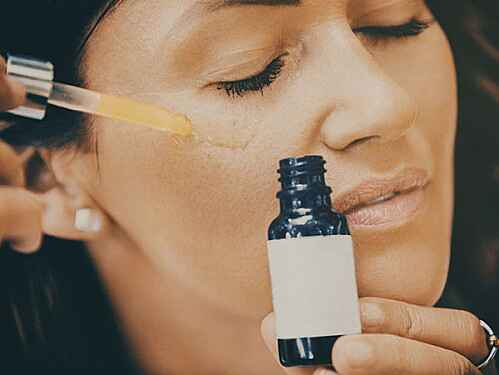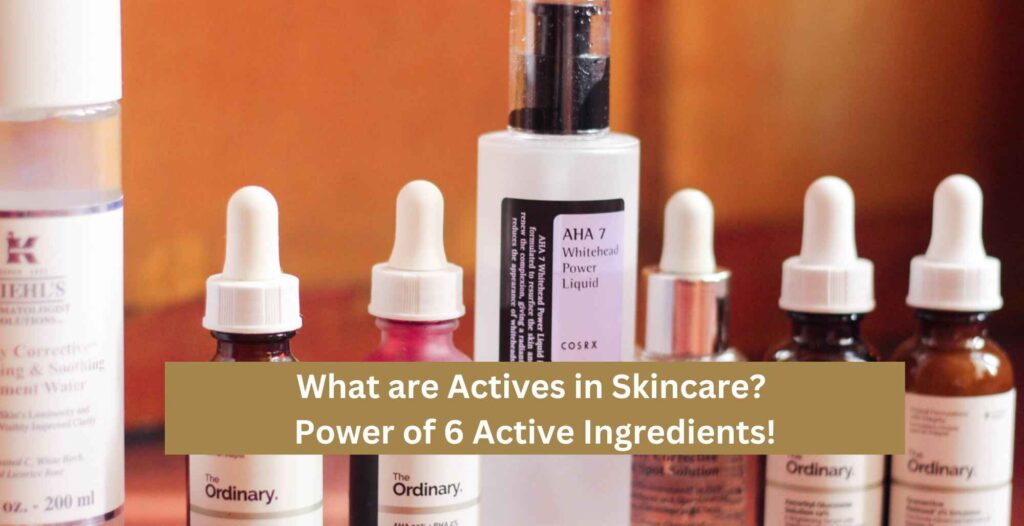Learn to incorporate vitamin C into your morning and nighttime skincare routines for anti-aging and brightening benefits.
Strong skincare ingredients like vitamin C are prized for their antioxidant, anti-aging, and brightening qualities. But to properly reap its advantages, knowing when to take vitamin C in your beauty routine is key.
Table of Contents:
What does vitamin C do for your skin?
Regarding skincare, vitamin C is an extremely potent antioxidant with several advantages for your skin. It works by neutralizing harmful free radicals caused by exposure to environmental factors like pollution and UV rays. This defense aids in preventing skin damage and early aging.

Skin brightening is one of the most widely used applications for vitamin C. By preventing the synthesis of melanin, it lessens hyperpigmentation and dark patches while also evens skin tone. Consequently, using vitamin C regularly might make your skin appear more luminous and radiant.
Besides its ability to brighten, vitamin C is essential for increasing collagen formation. The protein called collagen makes skin smooth, firm, and young-looking. Vitamin C enhances collagen, which helps smooth out wrinkles and fine lines while enhancing the skin’s overall flexibility and texture.
Types of Vitamin C
- L-ascorbic acid is the only “active” form of vitamin C and one of the most widely studied.
- L-ascorbic acid or ascorbic acid (LAA) is water-soluble and one of the most popular vitamin C ingredients.
- Tetrahexyldecyl ascorbate is an oil-soluble, stearic acid-derived form of vitamin C.
- Magnesium Ascorbyl Phosphate is a more stable form of water-soluble vitamin C often used in skin care products.
What to look for in a vitamin C serum?
- Choose the suitable vitamin C for your skin type.
- Look for serums containing stabilized forms like magnesium ascorbyl phosphate or sodium ascorbyl phosphate.
- Look for skincare products with a strength of 10% to 20% and a pH lower than 3.5.
- Look for products with added antioxidants and skin-brightening ingredients like retinol and ferulic acid.
Why Use Vitamin C in Skincare?
- Brightens Dull Skin: Vitamin C brightens dark spots, evens skin tone, and leaves your complexion healthy and radiant.
- Protects from Sun Damage and Pollution: Vitamin C is a potent antioxidant that protects your skin from damaging free radicals produced by pollutants and UV rays, delaying the onset of premature aging and pigmentation.
- Boosts Collagen Production: By minimizing fine lines and wrinkles, vitamin C promotes the formation of collagen, which keeps your skin firm, plump, and youthful.
When Should You Use Vitamin C in Your Skincare Routine? – Timing is Everything!
Morning Use:
Shields against toxins and UV radiation, two environmental stresses. It neutralizes free radicals throughout the day to serve as a barrier. By providing extra shielding against UV damage, sunscreen increases its protective power.
Night Use:
It helps with skin renewal and repair as you sleep. It increases the synthesis of collagen, which helps minimize fine wrinkles and enhance skin smoothness. This enables a more delicate application in the event that you employ retinol or other strong substances during the day.
Personal Preference:
Depending on your skin sensitivity and regimen, you can decide whether to apply vitamin C in the morning or at night.

How to Use Vitamin C in Skincare Routine?
Cleanse your face:
The first step is to clean your face completely to remove debris, oil, and pollutants. This guarantees that your skin is cleansed and prepared for the vitamin C serum to be absorbed efficiently.
Apply a toner :
If you use a toner, use it just after cleaning. Toners can help your skin absorb serums and moisturizers more effectively by balancing its pH. Although optional, this step can improve your routine’s efficacy.
Apply a few drops of vitamin C serum:
Using a few drops, apply a thin layer of your vitamin C serum to your entire face. Apply it lightly to your skin, paying particular attention to areas that are hyperpigmented or in need of brightening. Vitamin C should be applied immediately to clean, dry skin for optimal penetration and antioxidant advantages.
Follow with a moisturizer:
After applying vitamin C, use a moisturizer to seal in moisture and strengthen the skin barrier. A moisturizer also helps avoid any potential dryness or irritation caused by the serum.
Finish with sunscreen (if using in the morning):
It is always recommended to apply broad-spectrum sunscreen after vitamin C in the morning. While sunscreen is a necessary precaution against dangerous UV rays, vitamin C strengthens your skin’s defense against free radicals. This is essential in protecting your skin from the sun and keeping it that way all day.
How to Layer Vitamin C with Other Skincare Products?
- With Retinol: Because retinol and vitamin C are strong chemicals that may irritate skin when mixed, they are recommended at distinct times. Take retinol at night and vitamin C in the morning.

- With Niacinamide: Though there is some disagreement regarding their combination, a new study indicates that niacinamide and vitamin C can be taken together without any problems. Put on niacinamide after applying vitamin C.
- With Hyaluronic Acid: Vitamin C and hyaluronic acid work together to moisturize and plump the skin. Apply vitamin C first, then hyaluronic acid.
How does vitamin C benefit the skin?
- Vitamin C can help rejuvenate the skin, fighting off signs of aging associated with oxidative stress.
- Topical vitamin C products can provide benefits like improved skin texture, reduced appearance of fine lines and wrinkles, and brighter skin tone.
- Vitamin C can also help reduce the appearance of dark spots and hyperpigmentation.
Factors to Consider When Using Vitamin C:
Skin Type:
If you have sensitive skin, it’s critical to begin with a lesser dose of vitamin C (around 10%) to prevent irritation or redness. As your skin adjusts to the strength, gradually increase it. Vitamin C also benefits people with oily or acne-prone skin, but softer formulations are best for those with dry or sensitive skin.
Product Type:
Serums are the most efficient way to take vitamin C. Because serums are concentrated and made to penetrate deeply, the active ingredient can function as intended. While vitamin C serums are more potent than creams or moisturizers, they can still be helpful.
Storage:
Due to its sensitivity to air and light, vitamin C may oxidize and lose its potency. To maintain its potency, secure the cap and store your vitamin C product in a cold, dark area. Certain serums are packaged in amber or dark vials to keep the contents safe from light.
FAQs:
1. When is the best time to use vitamin C in my skincare routine?
Vitamin C is most effective when used in the morning, following cleaning but before moisturizing. Throughout the day, it aids in shielding your skin from harmful environmental elements, including pollution and UV rays. You can use it at night to stimulate skin healing while you sleep if that’s more your style.
2. Can I use vitamin C with other skincare products?
Yes, but making the right layering choices is crucial. For instance, to prevent inflammation, take retinol at night and vitamin C in the morning. Vitamin C interacts nicely with hyaluronic acid for hydration and niacinamide for calming the skin.
3. How often should I use vitamin C in my routine?
Depending on the concentration of the substance and how sensitive your skin is, you can use vitamin C once or twice a day. The majority of folks feel that using it every morning is effective.
4. Is it safe to use vitamin C with other active ingredients?
While vitamin C is beneficial on its own, it can be sensitive when paired with other powerful actives like retinol or AHAs. To prevent irritation, stronger components like retinol at night and vitamin C in the morning are recommended.
Conclusion:
Vitamin C is a potent substance that can completely change your skincare regimen by boosting youthful, firm skin, protecting your skin from injury, and brightening your complexion. For maximum benefit, it is recommended to apply vitamin C first thing in the morning, followed by moisturizer and sunscreen.
Read Also:


